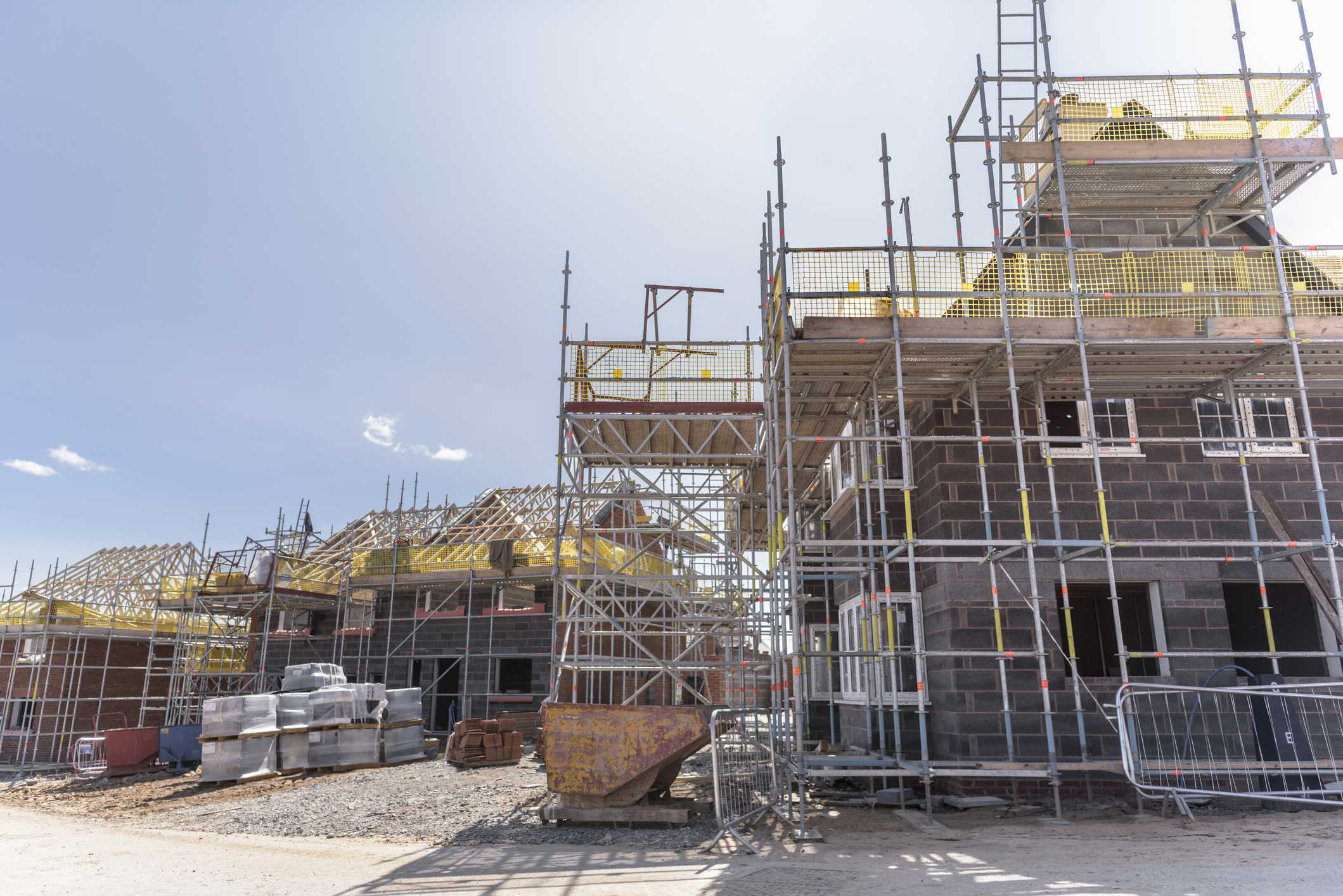Good news: UK house prices are stuck in the doldrums
UK house prices are set to tread water while incomes rise, making property more affordable, says Merryn Somerset Webb.

Get the latest financial news, insights and expert analysis from our award-winning MoneyWeek team, to help you understand what really matters when it comes to your finances.
You are now subscribed
Your newsletter sign-up was successful
Want to add more newsletters?

Twice daily
MoneyWeek
Get the latest financial news, insights and expert analysis from our award-winning MoneyWeek team, to help you understand what really matters when it comes to your finances.

Four times a week
Look After My Bills
Sign up to our free money-saving newsletter, filled with the latest news and expert advice to help you find the best tips and deals for managing your bills. Start saving today!

The numbers aren't looking good for residential property investors. House price growth in the US fell to a mere 1% at the beginning of this year, according to the latest report from the Dallas Federal Reserve. Look at global data across the 18 largest economies in the world and things don't look much more encouraging. This could be the year in which we see "global growth dip to its lowest pace in a decade". Investment is slowing fast, says Oxford Economics.
The UK is no outlier here. The Nationwide index and the Rightmove Asking Prices index show prices and asking prices respectively to be all but flat. The Halifax House Price index shows a better annual number but suggests prices fell mildly in June. You can see the same trend in Hometrack data, which suggests that the falling prices we have seen in London are beginning to spread: over a third of homes are now in areas with annual price falls (the higher value the market the more likely this is), although the absolute levels of falls is small. So what next? Most analysts expect the market to tread water from here (at best) although if a new PM were to pull a Brexit deal from the hat we could of course see a little London bounce.
A flat market...
This is probably correct. There is still some support for prices. Housing starts are falling slightly (so the supply of housing is not rising much). Interest rates are low and will go lower if Brexit goes horribly wrong. The banks' wholesale funding costs have also edged down, and that should soon feed into mortgage rates. At the same time wages have jumped (year-on-year growth excluding bonuses hit an 11-year high in April) and household disposable incomes are also on the up.
MoneyWeek
Subscribe to MoneyWeek today and get your first six magazine issues absolutely FREE

Sign up to Money Morning
Don't miss the latest investment and personal finances news, market analysis, plus money-saving tips with our free twice-daily newsletter
Don't miss the latest investment and personal finances news, market analysis, plus money-saving tips with our free twice-daily newsletter
That makes houses even at today's silly prices seem more affordable. Prices, says Nationwide, are likely to be at least supported by "healthy labour market conditions and low borrowing costs." That said, there isn't much to push prices up either. They are still high relative to incomes. The tax and regulatory hit to buy-to-let is discouraging buyers in that market. An unwelcome (to big property owners, at least) overhaul of property taxation may be on the way. And the Help to Buy scheme (which has played a clear part in pushing prices up) is likely to beat least scaled back soon. Put all those factors into the mix and it is hard to see a rebound in prices in 2019 "or beyond" says Capital Economics.
... is good news
The key thing to bear in mind there is that this is not bad news unless you very recently paid too much for a house. One thing we have all agreed on in the UK for decades now is that houses are too expensive relative to average earnings. That makes it tough to get on the ladder and tough to move up the ladder. Add today's high levels of stamp duty to your cost of buying and it's nasty out there.
But the fact that house prices are not really rising in nominal terms, combined with the small real rise in wages over the last two years, is beginning to change this situation. In 2007 Nationwide's house price to earnings ratio for the UK was 5.42. At the end of 2016 it was 5.25. Today it is 5.03 times. That's not ideal but if this gentle drift down continues and we end up at more like four times, it will suddenly be an awful lot easier to buy (and sell) houses. That would be a very good thing.
Head for Hampshire
Nevertheless, for those of you determined to find the next hot location in the property market and make your fortunes the easy way, Anne Ashworth writing in The Times has an idea for you. She suggests checking out age profiles. Why? Because the younger the crowd, the higher the potential for growth. In areas with an older demographic, you can expect to see sales and downsizing (the cash from which then gets spread around children and grandchildren who won't necessarily live in the area). In one with a younger demographic you can expect to see the opposite.
Look back over the last decade, says Lucian Cook of Savills and you will see this in action. Those areas with large concentrations of people in their 40s have seen much greater price appreciation (up 56%) than elsewhere. With that in mind, look at somewhere such as Aldershot in Hampshire. There 39% of households are headed by someone between 31 and 40. They won't be downsizing any time soon.
Housebuilders face a profit squeeze
Everybody's got an answer to the UK's housing crisis. Jeremy Hunt, for instance, has a new "Right to Own" plan in mind which he reckons will produce 1.5 million cheap homes. The cheap bit will be the result of forcing developers to share the rise in the value of their land post-planning permission with councils (there are echoes of the rationale for a land value tax here see here for moreon this).
He also wants to ease planning regulations so that people can "build up" (he's talking about putting new stories on top of existing apartment blocks). As far as Boris Johnson is concerned, we need to cut stamp duty, particularly in London, although he is not yet prepared to "put a figure" on it. And Prince Charles, who is more focused on quality than on price, reckons a series of policies that would allow more houses of better quality to be built is the answer.
The real answer is likely to be a combination of all these things. But it is worth noting that most plans to improve the UK market (Boris Johnson's aside) one way or another look likely to involve the housebuilders having to raise quality, quit landbanking, share planning bonanzas and submit to more regulation. None of those things will be good for their profits.
Get the latest financial news, insights and expert analysis from our award-winning MoneyWeek team, to help you understand what really matters when it comes to your finances.

-
 Average UK house price reaches £300,000 for first time, Halifax says
Average UK house price reaches £300,000 for first time, Halifax saysWhile the average house price has topped £300k, regional disparities still remain, Halifax finds.
-
 Barings Emerging Europe trust bounces back from Russia woes
Barings Emerging Europe trust bounces back from Russia woesBarings Emerging Europe trust has added the Middle East and Africa to its mandate, delivering a strong recovery, says Max King
-
 How a dovish Federal Reserve could affect you
How a dovish Federal Reserve could affect youTrump’s pick for the US Federal Reserve is not so much of a yes-man as his rival, but interest rates will still come down quickly, says Cris Sholto Heaton
-
 'Investors should brace for Trump’s great inflation'
'Investors should brace for Trump’s great inflation'Opinion Donald Trump's actions against Federal Reserve chair Jerome Powell will likely stoke rising prices. Investors should prepare for the worst, says Matthew Lynn
-
 The challenge with currency hedging
The challenge with currency hedgingA weaker dollar will make currency hedges more appealing, but volatile rates may complicate the results
-
 Can Donald Trump fire Jay Powell – and what do his threats mean for investors?
Can Donald Trump fire Jay Powell – and what do his threats mean for investors?Donald Trump has been vocal in his criticism of Jerome "Jay" Powell, chairman of the Federal Reserve. What do his threats to fire him mean for markets and investors?
-
 Freetrade’s new easy-access funds aim to beat top savings rates
Freetrade’s new easy-access funds aim to beat top savings ratesFreetrade has launched an easy-access exchange traded fund (ETF) range - here’s how the ETFs work and how they compare to the savings market
-
 Go for value stocks to insure your portfolio against shocks, says James Montier
Go for value stocks to insure your portfolio against shocks, says James MontierInterview James Montier, at investment management group GMO, discusses value stocks and slow-burn Minsky moments with MoneyWeek.
-
 Homebuilders report slumping profits as housing market stutters
Homebuilders report slumping profits as housing market stuttersPersimmon has become the latest UK homebuilder to warn on profits and completions as higher mortgage rates cool down the property market.
-
 Housing slowdown ‘deeper than anticipated’ as property sales slump
Housing slowdown ‘deeper than anticipated’ as property sales slumpNews New data from HMRC shows a fall in property sales - now experts predict a delay to the housing recovery